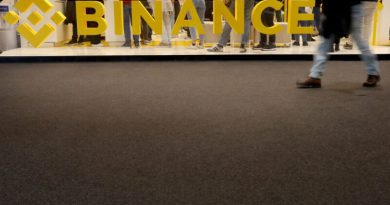Bankman-Fried Set To Enter Not Guilty Plea In FTX Fraud Case
NEW YORK, Jan 3 (Reuters) – Sam Bankman-Fried pleaded not guilty on Tuesday to criminal charges that he cheated investors in his now-bankrupt FTX cryptocurrency exchange and caused billions of dollars in losses, in what prosecutors have called an “epic” fraud.
He entered his plea in Manhattan federal court where he faces eight criminal counts, including wire fraud and money laundering conspiracy. The 30-year-old ex-mogul is accused of looting FTX customers’ deposits to support his Alameda Research hedge fund, buy real estate and donate millions of dollars to political causes.
“Customer funds were also used and laundered through political donations, charitable donations and a variety of venture investments,” Danielle Sassoon, a federal prosecutor, said at the hearing.
Sassoon suggested that the government has a deep well of evidence against Bankman-Fried, saying prosecutors will turn over hundreds of thousands of documents in coming weeks to the defense.
U.S. District Judge Lewis Kaplan on Tuesday set an Oct. 2 date for trial, which Sassoon said could last four weeks.
The government has already secured guilty pleas from two former top associates of Bankman-Fried’s – former Alameda chief executive Caroline Ellison and former FTX chief technology officer Gary Wang – who are cooperating with prosecutors and may testify at trial.
A clean-shaven Bankman-Fried wore a blue suit, white shirt and dotted blue tie and carried a backpack into the courthouse – a far cry from the shorts and t-shirts that were his preferred attire when he ran FTX from the Bahamas.
Bankman-Fried did not speak to the judge during the hearing, but conferred privately with his lawyers. He shook hands with one of the prosecutors before the arraignment. When it ended, he approached the handful of courtroom sketch artists and commented on their work.
The Massachusetts Institute of Technology graduate could face up to 115 years in prison if convicted. He has previously acknowledged making mistakes at FTX but said he does not believe he has criminal liability.
‘MORE LENIENT’
[1/7] Defense attorney Mark Cohen, pleads “not guilty” for his client Sam Bankman-Fried, founder and former CEO of crypto currency exchange FTX, at his plea hearing in Manhattan federal court in New York City, U.S., January 3, 2023 in this courtroom sketch. Defense attorney Christian Everdell sits at left. REUTERS/Jane Rosenberg
Bankman-Fried rode a boom in the value of bitcoin and other digital assets to build a net worth of an estimated $26 billion and become an influential political donor in the United States.
FTX collapsed in early November after a wave of withdrawals and declared bankruptcy on Nov. 11, wiping out Bankman-Fried’s fortune. He later said he had $100,000 in his bank account.
He was extradited last month from the Bahamas, where he lived and where the exchange was based.
Since his release on a $250 million bond on Dec. 22, Bankman-Fried has been subject to electronic monitoring and required to live with his parents, Joseph Bankman and Barbara Fried, both professors at Stanford Law School in California. Fried attended her son’s hearing on Tuesday.
On Tuesday, Kaplan imposed a new bail condition, saying Bankman-Fried cannot access FTX or Alameda assets.
That came after Sassoon accused Bankman-Fried of seeking to transfer assets to an unnamed foreign country that he thought would be “more lenient.” She said prosecutors were also probing reports late last month that funds were transferred out of Alameda cryptocurrency wallets, though she said there was not evidence Bankman-Fried executed those transactions.
Mark Cohen, Bankman-Fried’s lawyer, said his client “did not make” the Alameda transfers. Referring to the accusation that Bankman-Fried sought to transfer money overseas, he said his client had sought to comply with a court order in the Bahamas, which last month temporarily seized some FTX assets.
The Securities Commission of the Bahamas – the Caribbean nation’s financial regulator – did not immediately reply to a request for comment.
Kaplan on Tuesday also granted Bankman-Fried’s request not to publicize the names of two additional co-signers for the bond.
Lawyers for Bankman-Fried have said his parents, who co-signed the bond, have received physical threats since FTX’s collapse, and that other co-signers might face similar harassment.
Reporting by Jack Queen and Luc Cohen in New York
Additional reporting by Jonathan Stempel in New York
Editing by Noeleen Walder and Matthew Lewis
Our Standards: The Thomson Reuters Trust Principles.
READ MORE HERE

